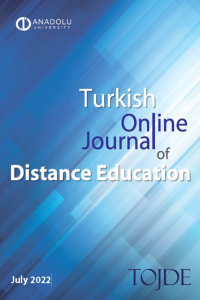Abstract
References
- Abubakari, M. S., & Mashoedah. (2021). Online Learning Engagement Model for International Students in Indonesia amid Covid-19 Period: A Conceptual Model Proposal. International Journal of Distance Education and E-Learning, 6(2), 15–30. https://doi.org/10.36261/ijdeel.v6i2.1859
- Agarwal, R., & Prasad, J. (1998). A Conceptual and Operational Definition of Personal Innovativeness in the Domain of Information Technology. Information Systems Research, 9(2), 204–215. https://doi. org/10.1287/isre.9.2.204
- Akpan, I. D., & Umobong, M. E. (2013). Analysis of Achievement Motivation and Academic Engagement of Students in the Nigerian Classroom. Academic Journal of Interdisciplinary Studies, 2(3), 385– 390. https://doi.org/10.5901/ajis.2013.v2n3p385
- Al-Busaidi, K. A., & Al-Shihi, H. (2012). Key factors to instructors’ satisfaction of learning management systems in blended learning. Journal of Computing in Higher Education, 24(1), 18–39. https://doi. org/10.1007/s12528-011-9051-x
- Ali, A., & Ahmad, I. (2011). Key Factors for Determining Student Satisfaction in Distance Learning Courses: A Study of Allama Iqbal Open University. Contemporary Educational Technology, 2(2), 118–134. https://doi.org/10.30935/cedtech/6047
- Alivernini, F., & Lucidi, F. (2008). The academic motivation scale (AMS): Factorial structure, invariance, and validity in the Italian context. TPM - Testing, Psychometrics, Methodology in Applied Psychology, 15(4), 211–220.
FACTORS INFLUENCING ONLINE LEARNING ENGAGEMENT: INTERNATIONAL STUDENTS’ PERSPECTIVE AND THE ROLE OF INSTITUTIONAL SUPPORT
Abstract
The study was intended to model online learning engagement of international students studying in Indonesia to determine which factors affect learner engagement. A survey was conducted online, and 102 international students filled the questionnaire. Partial Least Squares-Structural Equation Modeling (PLS-SEM) technique was used for data analysis. The results show that the variables: university support (T = 2.881, P< 0.01), motivation (T = 3.411, P< 0.01), and personal innovativeness (T = 2.426, P< 0.05) were the significant predictors of international students’ engagement in online learning. Other variables like instructor interactivity, student-material interaction, student-student interactions, and self-regulated learning didn’t significantly affect learner engagement. The findings of this exploration can be used as empirical data for higher education institutions’ managers when developing support programs for international students during their studies in a destination country. Other findings’ implications and recommendations are discussed.
Keywords
International students institutional support motivation online learning self-regulated learning student engagement
References
- Abubakari, M. S., & Mashoedah. (2021). Online Learning Engagement Model for International Students in Indonesia amid Covid-19 Period: A Conceptual Model Proposal. International Journal of Distance Education and E-Learning, 6(2), 15–30. https://doi.org/10.36261/ijdeel.v6i2.1859
- Agarwal, R., & Prasad, J. (1998). A Conceptual and Operational Definition of Personal Innovativeness in the Domain of Information Technology. Information Systems Research, 9(2), 204–215. https://doi. org/10.1287/isre.9.2.204
- Akpan, I. D., & Umobong, M. E. (2013). Analysis of Achievement Motivation and Academic Engagement of Students in the Nigerian Classroom. Academic Journal of Interdisciplinary Studies, 2(3), 385– 390. https://doi.org/10.5901/ajis.2013.v2n3p385
- Al-Busaidi, K. A., & Al-Shihi, H. (2012). Key factors to instructors’ satisfaction of learning management systems in blended learning. Journal of Computing in Higher Education, 24(1), 18–39. https://doi. org/10.1007/s12528-011-9051-x
- Ali, A., & Ahmad, I. (2011). Key Factors for Determining Student Satisfaction in Distance Learning Courses: A Study of Allama Iqbal Open University. Contemporary Educational Technology, 2(2), 118–134. https://doi.org/10.30935/cedtech/6047
- Alivernini, F., & Lucidi, F. (2008). The academic motivation scale (AMS): Factorial structure, invariance, and validity in the Italian context. TPM - Testing, Psychometrics, Methodology in Applied Psychology, 15(4), 211–220.
Details
| Primary Language | English |
|---|---|
| Journal Section | Articles |
| Authors | |
| Publication Date | July 1, 2022 |
| Submission Date | June 17, 2021 |
| Published in Issue | Year 2022 Volume: 23 Issue: 3 |


